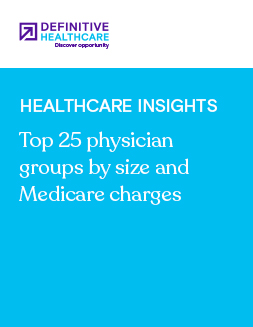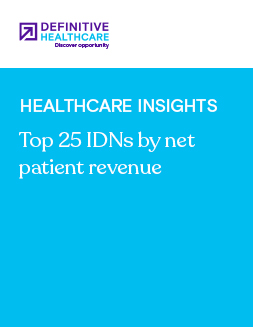Healthcare Insights
Top 10 hematology and coagulation procedure codes
Hematology is the study of blood and medical disorders related to blood. Hematologists specialize in treating and diagnosing blood disorders such as anemia, infection, hemophilia, blood-clotting disorders, and leukemia.
Using Definitive Healthcare’s Atlas All-Payor Claims Dataset, we created a list of the 10 most frequent medical procedures related to hematology and coagulation for the year 2023.
| Rank | HCPCS/CPT code | HCPCS/CPT description | % total procedures | Explore dataset |
|---|---|---|---|---|
| 1 | 85025 | Blood count; complete CBC w/ automated differential WBC count | 46.40% | Explore |
| 2 | 85027 | Blood count; complete CBC w/ automated count | 15.50% | Explore |
| 3 | 85610 | Prothrombin time | 10.10% | Explore |
| 4 | 85018 | Blood count; hemoglobin | 8.80% | Explore |
| 5 | 85730 | Thromboplastin time, partial; plasma or whole blood | 4.90% | Explore |
| 6 | 85652 | Sedimentation rate; RBC automated | 2.30% | Explore |
| 7 | 85379 | Fibrin degradation products; quantitative | 1.60% | Explore |
| 8 | 85014 | Blood count; HCT | 1.50% | Explore |
| 9 | 85048 | Blood count; leukocyte, automated | 1.30% | Explore |
| 10 | 85041 | Automated RBC count | 1.20% | Explore |
Fig. 1 Analysis of data from the Definitive Healthcare’s Atlas All-Payor Claims Dataset. Commercial claims data is sourced from multiple medical claims clearinghouses in the United States and updated monthly. Data accessed June 2024.
What are the most common hematology and coagulation-related procedures?
The most common hematology-related procedure is the complete blood count with auto differential (CPT code 85025). This common lab test records the volume and types of a patient’s red and white blood cells, platelet counts, and hemoglobin levels. Complete blood counts are often employed as a part of routine preventive care and when patients are sick to rule out certain diagnoses or to monitor treatment efficacy. Because of this broad variety of applications, complete blood counts represent 46.4% of total hematology procedures.
The second most common hematology-related procedure is represented by CPT code 85027, a complete blood count (or “automated blood count”) that does not measure white blood cells. This test is usually conducted on patients with less serious blood-related issues. Doctors typically test for both blood cell types at the same time, so this test only accounts for 115.5% of total procedures.
The third most common hematology-related procedure is the “prothrombin time” blood test (CPT code 85610). Prothrombin is a liver-based protein that helps to maintain the appropriate levels of clotting in the blood. This test measures the time it takes for the blood to form a clot and is often performed before surgeries or to monitor patients taking the blood thinning medication warfarin. The prothrombin time test accounts for 10.5% of all hematology procedures.
What is coagulation?
Coagulation is the process through which blood changes from a liquid to a thicker gel-like consistency. Coagulation is a part of the process known as hemostasis, which is how the body stops bleeding when necessary.
Proper coagulation is crucial for the wound-healing process. When a blood vessel breaks due to a wound or other form or injury, coagulation forms a clot that seals the rupture while the tissue repairs itself.
Why is hematology important to healthcare?
Hematology is important to healthcare because it involves the study of blood and life-threatening blood related illnesses.
Blood plays a central role in our overall health, physiological and immune function, and every bodily system. Hematology—and hematological tests in particular—enables physicians to monitor all sorts of bodily functions, determine treatment effectiveness, and diagnose illnesses.
Learn more
Healthcare Insights are developed with healthcare commercial intelligence from the Definitive Healthcare platform. Want even more insights? Start a free trial now and get access to the latest healthcare commercial intelligence on hospitals, physicians, and other healthcare providers.


